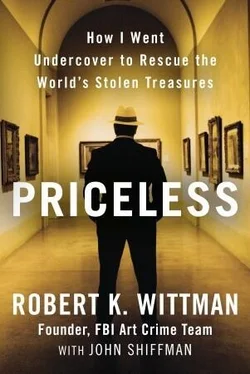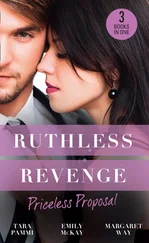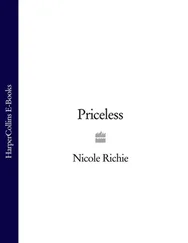One of our neighbors, Walter Gordon, was a special agent in the FBI’s Baltimore division. When I was ten years old, he was the coolest man I knew. Mr. Gordon wore a fine suit, shined shoes, and crisp white shirt every day. He drove the nicest car on the block, a bureau-issue late-model green two-door Buick Skylark. People looked up to him. I knew that he carried a gun, but I never saw it, only deepening his G-man mystique. I hung out with three of his sons, Jeff, Dennis, and Donald, playing stoopball in their front yard and trading baseball cards in their basement. The Gordons were genuinely kind people who embraced our struggling family without making it feel like charity. When I turned eleven, Mrs. Gordon heard that I had never had a birthday cake. So she baked one for me, layered with dark chocolate. Years later, when Mr. Gordon heard that my dad had opened a new seafood restaurant, he began to bring fellow agents there for lunch, even though it was out of the way, in a sketchy part of town near the Pimlico racetrack. I knew Mr. Gordon didn’t come for the food. He came to bring paying customers to help a neighbor.
The restaurant, a short-lived enterprise called Neptune’s Galley, was only one of my dad’s many start-up businesses. Whatever the venture, Dad was always boss-owner and a gregarious guy, never cheap, but we struggled to build savings and financial stability. He opened a home-remodeling company, raced second-tier Thoroughbreds, created a college catalog business, and wrote a book on how to win the lottery. He ran unsuccessfully for city council and opened an antiques storefront on Howard Street called Wittman’s Oriental Gallery. That business was among his most successful and satisfying. My dad figured I’d join him in his business ventures and my mom hoped I would become a professional classical pianist. (I was accomplished in high school, but I soon discovered I wasn’t good enough to make a career of it.)
By the time I entered Towson University in 1973—as a part-time night student, taking classes as I could afford them—I knew what I wanted to be: an FBI agent. I kept these plans to myself. I’m the kind of guy who doesn’t like to talk much about what he’s going to do until he does it. I guess the trait comes from my mom’s Japanese heritage. Besides, I didn’t want to disappoint my parents.
Still, my view of the FBI had matured. The job now seemed not only interesting but sensible, responsible yet thrilling. I liked the notion of protecting the innocent, investigating cases, working as a policeman whose main weapon is his brain, not his gun. I also liked the idea of serving my country, and still felt guilty that the Vietnam draft lottery had ended the year before I turned eighteen. And after years of watching my dad struggle as a small businessman, I also could not ignore the promise of a stable government job with guaranteed benefits. Another allure was an agent’s sense of honor, or gedi in Japanese. The little I knew about FBI agents came mostly from watching Mr. Gordon and from television. But it seemed like an honorable profession and a good way to serve my country. After I graduated from Towson, I called the FBI and asked for a job.
I excitedly told the agent who took my call that I met each of the FBI’s requirements. I was twenty-four years old, a college graduate, a U.S. citizen, and had no criminal record.
That’s nice, kid, the agent said as kindly as he could. “But we like our applicants to get three years’ real-world work experience first. Give us a call then.” Discouraged, I moved to Plan B: the Foreign Service, figuring I could work for the State Department and travel for three years, then transfer to the FBI. I took the exam, but didn’t get the job. Apparently, I didn’t have enough political juice.
The same year, my brother Bill and I joined my dad in a new business, a monthly agricultural newspaper called The Maryland Farmer . Neither my dad nor I knew anything about journalism or farming, but the paper was 75 percent ads anyway—for fertilizer, seed, dairy products, tractors, anything a farmer might need. Our advertisers were as big as Monsanto and as small as a local general store. I had never set type or written a headline, and I couldn’t tell the difference between an Angus and a Holstein. But I quickly learned how to do all of those things. I also learned the art of listening. I met with farmers, judged farm show contests, wooed corporate executives, and got to know career bureaucrats. I wrote stories, edited them, sold ads, designed headlines, supervised copy as it was punched into the big Compugraphic machine, and used an X-Acto knife to paste it all onto the page. We did fairly well, and by 1982, Wittman Publications had expanded to four states. I traveled extensively, perhaps a hundred thousand miles a year, learning how to sell a product, and more important, to sell myself, a skill that would become essential years later when I worked undercover. I mastered the most important lesson of sales: If someone likes the product, but doesn’t like you, they won’t buy it; if, on the other hand, they’re not crazy about the product, yet they like you, well, they may buy it anyway. In business, you have to sell yourself first. It’s all about impressions.
On the road, I learned how to manipulate—how to make cattlemen, peanut farmers, tobacco growers, and lobbyists believe this city boy cared about their issues. But I didn’t really care. I still longed to join the FBI. And after eight years of constant deadlines, weekly scrambles to find advertisers, and managing banal disputes between reporters and advertising salesmen, the job got old.
One October evening, after another frantic day at the office, I headed out to blow off some steam and grab a good dinner. I made my way to a trendy new restaurant in the city, a place where I knew I could grab a great bowl of lobster bisque and catch Game Four of the American League Championship Series, the Orioles versus the Angels. My bisque arrived and hit the spot; I’d been so busy that day I’d missed lunch. The Orioles jumped out to a three-run lead in the fourth inning, but at the bar, a blond woman kept bobbing up and down, blocking my view of the television. I found it irritating. But during the fifth inning, she turned slightly and I caught her profile. Wow. This woman was a radiant beauty with a smile that made me forget the game. I introduced myself, tried to stay cool. We spoke for an hour and she finally agreed to give me her number. Her name was Donna Goodhand, and she was twenty-five years old, a dental office manager with a bright sense of humor. On the rear of her white 1977 Malibu Classic was a bumper sticker that said, IGNORE YOUR TEETH AND THEY WILL GO AWAY. I liked her style, and I thought I’d acted suavely during our first encounter. Later, she would confide that she hadn’t seen it that way—she originally found me pushy, obnoxious. By her account, I rescued myself on our third date, when I took her to my parents’ home and serenaded her with “Unchained Melody” on the piano. We married two and a half years later.
In the mid-1980s, Donna and I had two young sons, Kevin and Jeffrey. We lived in a tiny townhouse and, because my newspaper business was too small to provide medical benefits, Donna worked full-time for the Union Carbide Corporation.
One day in 1988, Donna showed me a newspaper ad that said the FBI was hiring. I played it cool and shrugged, careful not to raise expectations, still embarrassed by the post-graduation call. But my mind drifted back to the notions of service, honor, independence, Mr. Gordon and Efrem Zimbalist Jr. I also knew I didn’t have much more time. I was thirty-two years old. The FBI stopped taking new agents at age thirty-five. Without telling Donna, I took the aptitude test at the FBI offices in Baltimore. I figured if I failed, I wouldn’t tell anyone and that would be it. A few months later, an FBI agent showed up at the newspaper and asked to see me. I took him into my private office and we sat down. He was thin, tall, and wore large round glasses with thick lenses. He wore a cheap light-brown sport coat and blue trousers. The agent was there to check my background, but we also talked a lot about what it was like to be an agent. He was a good salesman. Then again, I was an easy sell.
Читать дальше












